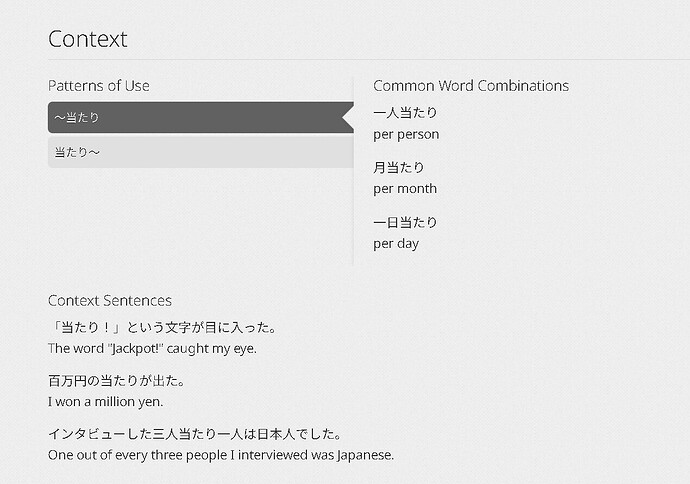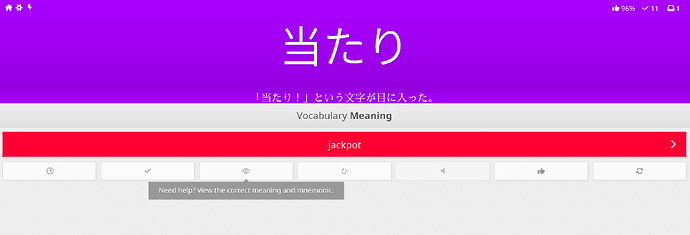Well since my last post generated such heated discussion, and apparently I’m a sucker for punishment, how do these context sentences in any way relate to the definition for 当たり?
The primary is: A success.
The context examples are all entirely different…
So how is this actually used in real life? The most common two usages of this kanji I see in the wild are 弁当 and 当店. Neither of which have anything to do with any of the definitions.
This is my second time through WK as I stalled out at level 24, took a long break to focus on other study activities, reset to zero, and coming through a second time the context surrounding a lot of the kanji is a completely different experience.
3 Likes
I can see how the third context sentence doesn’t appear related,
But the first and second one seem related to the primary definition to me.
If you win a million yen, that means you were the successful one (compared to the people who lost).
Same with winning a jackpot , so if someone saw the word “jackpot” on a slot machine, that’s not any different from seeing the word “success” in a slot machine.
I think possibly you might be confused because “a success” has a lot of different use cases in English. It could mean a successful plan, a successful career person, finding a lost item successfully, winning, and more. But that doesn’t mean in Japanese that all of these definitions of “a success” apply.
(And as far as the common use of the kanji in the two words you mentioned, that doesn’t really matter as far as this particular vocab. Some vocabulary words aren’t strongly related to their kanji btw. Like たくさん, which means “a lot” is 沢山, which means swampy mountain. That’s just Japanese being Japanese and not a WK-specific thing)
5 Likes
Well maybe, but that’s quite a stretch. Although jisho.org does list 大当たり as the definition of “jackpot”. And interestingly there’s 小当たり for those who are not quite so fortunate.
But the explanation of the meaning doesn’t explain this context at all. " What happens when you get “a right?” You get a success."
And “I won a million yen.”? Well, “won” is the past tense verb of “to win” and the WK definition specifically states 当たりis a noun. If you wanted to use the verb form would you not write 百万円が当たりました。?
Which is most certainly why I always see たくさん written in kana alone.
1 Like
Below are the first three (of 10) entries in the Monokakido app version of the Kenkyusha dictionary:
あたり2【当たり】
1 〔命中〕 a hit.
〔射的で〕 当たりが 5 発だった.
Five shots hit the target | I 「made [scored] five hits.
〔くじで〕 この箱の中に当たりが 10 本ある.
There are ten possible winners in this box.
〔くじで〕 当たりを引く
draw [get] a winning number; win a prize (in a lottery).
2 〔的中〕
「あの髪の長いのが君の彼女だな」 「当たり!」
“The long-haired one is your girlfriend, isn’t she?”—“Bingo [Good guess, 《英》 Spot on]!”
3 〔興行の成功〕 (a) success; a hit.
当たりを取る
be a (big) success; 《口》 make a hit.
Other contexts include fishing, like:
当たりがあった.
I 「got [had] a bite. | A fish took the bait.
5 Likes
And how would you translate “好きな食べ物” into English? probably “A food I like” or similar, changing the adjective to a verb. Just because something is one part of speech in Japanese doesn’t mean it’s the same in English, sometimes translating something well means dealing with these inconsistencies so that people in the target language can understand more easily, and not just literally translating something exactly.
I think of 当たり and 当たる as kind of metaphorically (or physically) “hitting” something in most cases - “hitting” a jackpot, “hitting” a correct answer, “hitting” a certain amount of things, “hitting” a literal target. Doesn’t perfectly line up with English of course, because there’s a lot of different related definitions and ways of using it. Instead of trying to line it up 1-1 with an English concept, it’s best to just go and look at lots and lots of example sentences, read a lot, see it be used, and get a feel for it. Have a conception of it in your mind, be aware of how it’s used when you see it, and you’ll develop a better understanding of it.
edit: and monolingual dictionaries are usually a better way of getting a feel for how a word is used. Admittedly it can be hard to decipher the entries when starting out, though, so maybe that’s more an intermediate-advanced thing.
7 Likes
You’ll find that some words will be stretches. Not everything matches one to one, and just like we can use figurative language so can Japanese. 当たり is a success in the sense of jackpot, sudden win, lucky hit.
And 弁当 has absolutely nothing to do with any of that. It’s just written that way because some words just use kanji that fit sounds, not the common meaning. It’s called a phonetic ateji.
Just because it’s the first one I thought of doesn’t mean there aren’t other more frequent examples of phonetic ateji. You found one with 弁当. Here’s another 寿司.
This is the thing that needs changing. The primary meaning is fine; the sentences are fine.
The meaning explanation however is pretty bad and could use tweaking to make it clearer which definitions of the word “success” are appropriate.
8 Likes
Thanks for bringing this up, I’ll let the content team know and see if we can improve 当たり a little.
1 Like
It means “success” in the sense of “attaining the aimed goal”
Note that あたり can also be written 辺り, in the neighboring, around.
The idea is one of “spot on”
It comes from verb あたる to reach (hit) your target.
Given the first context sentence, why isn’t this word on the allow list?
I think it’s probably just an oversight. I’ll let you know what the content team decide once they get back to me.

